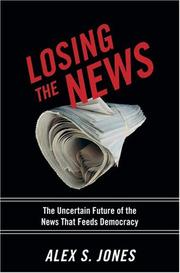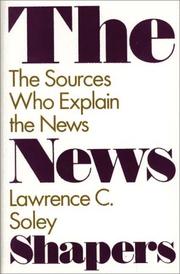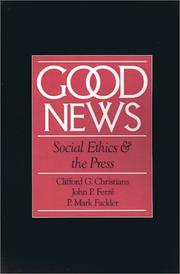| Listing 1 - 10 of 11 | << page >> |
Sort by
|
Book
ISBN: 1282346326 019971052X 9780199710522 Year: 2010 Publisher: New York Oxford Oxford University Press
Abstract | Keywords | Export | Availability | Bookmark
 Loading...
Loading...Choose an application
- Reference Manager
- EndNote
- RefWorks (Direct export to RefWorks)
Rupert Murdoch's multibillion-dollar purchase of the Wall Street Journal in 2007 was but one more chapter in an untold story: the rise of an integrated conservative media machine that all began with Rush Limbaugh in the 1980s. Kathleen Hall Jamieson and Joseph Cappella--two of the nation's foremost experts on politics and communications--here offer a searching analysis of the conservative media establishment, from talk radio to Fox News to the editorial page of the Wall Street Journal. Indeed, Echo Chamber is the first serious account of how the conservative media arose, what it consists of, a
Conservatism -- United States. --- Journalism -- Objectivity -- United States. --- Limbaugh, Rush H. --- Radio & TV Broadcasting --- Journalism & Communications --- Conservatism --- Journalism --- Objectivity
Multi
ISBN: 9781538110720 9781538110713 9781538110737 1538110717 1538110725 Year: 2019 Publisher: Lanham, Md Rowman & Littlefield
Abstract | Keywords | Export | Availability | Bookmark
 Loading...
Loading...Choose an application
- Reference Manager
- EndNote
- RefWorks (Direct export to RefWorks)
Journalistic ethics --- Journalism --- Objectivity --- Political aspects --- History --- Perswetenschappen --- Beroepsethiek. Deontologie --- Professional ethics. Deontology --- Journalistic ethics - United States --- Journalism - Objectivity - United States --- Journalism - Political aspects - United States - History - 21st century
Book
ISBN: 9780226589176 022658917X 022666743X Year: 2019 Publisher: Chicago : The University of Chicago Press,
Abstract | Keywords | Export | Availability | Bookmark
 Loading...
Loading...Choose an application
- Reference Manager
- EndNote
- RefWorks (Direct export to RefWorks)
"#MeToo. #BlackLivesMatter. #NeverAgain. #WontBeErased. Though both the right- and left-wing media claim "objectivity" in their reporting of these and other contentious issues, the American public has become increasingly cynical about truth, fact, and reality. In The View From Somewhere, Lewis Raven Wallace dives deep into the history of "objectivity" in journalism and how it's been used to gatekeep and silence marginalized writers as far back as Ida B. Wells. At its core, this is a book about fierce journalists who have pursued truth and transparency and sometimes been punished for it--not just by tyrannical governments but by journalistic institutions themselves. He highlights the stories of journalists who question "objectivity" with sensitivity and passion: Desmond Cole of the Toronto Star; New York Times reporter Linda Greenhouse; Pulitzer Prize-winner Rachel Kadzi Ghansah; Peabody-winning podcaster John Biewen; Guardian correspondent Gary Younge; former Buzzfeed reporter Meredith Talusan; and many others. Wallace also shares his own experiences as a midwestern transgender journalist and activist who was fired from his job as a national reporter for public radio for speaking out against "objectivity" in coverage of Trump and white supremacy. With insightful steps through history, Wallace stresses that journalists have never been mere passive observers--the choices they make reflect worldviews tinted by race, class, gender, and geography. He upholds the centrality of facts and the necessary discipline of verification but argues against the long-held standard of "objective" media coverage that asks journalists to claim they are without bias." -- Publisher's website
Journalism --- Journalistic ethics --- Social movements --- Social justice --- Objectivity --- Press coverage --- Journalistic ethics. --- Objectivity. --- United States. --- Journalism - Objectivity - United States --- Journalistic ethics - United States --- Social movements - Press coverage - United States --- Social justice - Press coverage - United States
Multi
ISBN: 9781509528059 9781509528080 9781509528042 1509528083 1509528040 1509528059 1509528067 1509528083 Year: 2018 Publisher: Cambridge Polity
Abstract | Keywords | Export | Availability | Bookmark
 Loading...
Loading...Choose an application
- Reference Manager
- EndNote
- RefWorks (Direct export to RefWorks)
Can we talk about the news media without proclaiming journalism either our savior or the source of all evil ? It is not easy to do so, but it gets easier if we put the problems and prospects of journalism in historical and comparative perspective, view them with a sociological knowledge of how newsmaking operates, and see them in a political context that examines how political institutions shape news as well as how news shapes political attitudes and institutions. Adopting this approach, Michael Schudson examines news and news institutions in relation to democratic theory and practice, in relation to the economic crisis that affects so many news organizations today and in relation to recent discussions of “fake news.” In contrast to those who suggest that journalism has had its day, Schudson argues that journalism has become more important than ever for liberal democracies as the keystone institution in a web of accountability for a governmental system that invites public attention, public monitoring and public participation. For the public to be swayed from positions people have already staked out, and for government officials to respond to charges that they have behaved corruptly or unconstitutionally or simply rashly and unwisely, the source of information has to come from organizations that hold themselves to the highest standards of verification, fact-checking, and independent and original research, and that is exactly what professional journalism aspires to do.This timely and important defense of journalism will be of great value to anyone concerned about the future of news and of democracy
Journalism --- Fake news --- History --- Objectivity --- Political aspects --- News, Fake --- Disinformation --- Hoaxes --- Writing (Authorship) --- Literature --- Publicity --- E-books --- Journalism - United States - History - 21st century --- Journalism - Objectivity - United States - History - 21st century --- Journalism - Political aspects - United States - History - 21st century --- Fake news - United States
Book
ISBN: 9781433128233 9781433128240 9781433139406 9781433139413 9781433139420 1433128233 1433128241 Year: 2017 Publisher: New York, N.Y. Peter Lang
Abstract | Keywords | Export | Availability | Bookmark
 Loading...
Loading...Choose an application
- Reference Manager
- EndNote
- RefWorks (Direct export to RefWorks)
"This study investigates US, UK and German news media coverage of a range of cases that involved human rights violations during military operations including Kosovo, Iraq, Libya, Syria and Egypt. It will be demonstrated that 'humanitarian intervention' and R2P are evoked in the news media if so called 'enemy' countries of Western states conduct human rights violations. The Western news media shows far less concern for human rights violations if they are conducted by Western states and their 'allies'. The news media is supposed to scrutinize governments particularly during times of war. Yet, this study demonstrates that the news media plays a crucial role in facilitating a selective process of shaming during the build-up towards military interventions. This process has led to an erosion of internationally agreed norms of non-intervention, as enshrined in the UN Charter".--Provided by publisher.
Journalism --- War --- Kosovo War, 1998-1999 --- Human rights --- Mass media and propaganda. --- Press coverage. --- Objectivity --- Mass media and propaganda --- Press coverage --- WAR--PRESS COVERAGE --- HUMAN RIGHTS --- MASS MEDIA AND PROPAGANDA --- MASS MEDIA AND WAR --- INTERVENTION (INTERNATIONAL LAW) --- War - Middle East - Press coverage --- War - Africa, North - Press coverage --- Kosovo War, 1998-1999 - Press coverage --- Human rights - Press coverage --- Journalism - Objectivity - United States --- Journalism - Objectivity - Great Britain --- Journalism - Objectivity - Germany (West)

ISBN: 9780195181234 0195181239 0199754144 9786612270734 1282270737 0199720568 0199740984 9780199720569 9781282270732 0197725007 Year: 2009 Publisher: New York, N.Y. Oxford University Press
Abstract | Keywords | Export | Availability | Bookmark
 Loading...
Loading...Choose an application
- Reference Manager
- EndNote
- RefWorks (Direct export to RefWorks)
Pulitzer Prize-winning journalist Alex S. Jones explores how the epochal changes sweeping the media have eroded the core news that has been the essential food supply of our democracy. At a time of dazzling technological innovation, Jones says that what stands to be lost is the fact-based reporting that serves as a watchdog over government, holds the powerful accountable, and gives citizens what they need. In a tumultuous new media era, with cutthroat competition and panic over profits, the commitment of the traditional news media to serious news is fading. Should we lose a critical mass of this news, our democracy will weaken--and possibly even begin to fail. This book is also a call to arms. Despite the current crisis, there are many hopeful signs, and Jones closes by looking over the horizon and exploring ways the iron core can be preserved.--From publisher description
Journalism --- Journalistic ethics --- Political aspects --- Economic aspects --- Objectivity --- United States --- #SBIB:309H1010 --- #SBIB:309H1025 --- Writing (Authorship) --- Organisatorische aspecten van de media: algemene werken (incl. journalistiek) --- Mediaboodschappen met een informatieve functie --- Presse --- Journalisme --- Journalistes --- Aspect politique --- Aspect économique --- Objectivité --- Déontologie --- Literature --- Publicity --- Fake news --- Journalism - Political aspects - United States --- Journalism - Economic aspects - United States --- Journalism - Objectivity - United States --- Journalistic ethics - United States --- United States of America
Book
ISBN: 9780231174459 9780231174442 9780231543095 0231174446 0231174454 0231543093 Year: 2017 Publisher: New York : Columbia University Press,
Abstract | Keywords | Export | Availability | Bookmark
 Loading...
Loading...Choose an application
- Reference Manager
- EndNote
- RefWorks (Direct export to RefWorks)
When we encounter a news story, why do we accept its version of events? A complicated set of cultural, structural, and technological relationships inform this interaction, and Journalistic Authority provides a relational theory for explaining how journalists attain authority. The book argues that authority is not a thing to be possessed or lost, but a quality of the connections between those laying claim to being an authority and those who assent to it. Matt Carlson examines the practices journalists use to legitimate their work: professional orientation, development of specific news forms, and the personal narratives they circulate to support a privileged social place. He then considers journalists' relationships with the audiences, sources, technologies, and critics that shape journalistic authority in the contemporary media environment. Carlson argues that journalistic authority is always the product of complex and variable relationships. By creating a schema to account for this complexity, he presents a new model for critiquing journalism while advocating for the norms and practices we want to be authoritative.
Journalism --- Journalistic ethics --- Digital media --- Electronic media --- New media (Digital media) --- Mass media --- Digital communications --- Online journalism --- Writing (Authorship) --- Literature --- Publicity --- Fake news --- History --- Objectivity --- journalistikk --- nyhetsjournalistikk --- digitale medier --- digital media --- etikk --- autoritet --- objektivitet --- Journalism - Objectivity - United States --- Journalistic ethics - United States --- Journalism - United States - History - 21st century --- Digital media - United States --- Presse --- Journalistes --- Journalisme --- Médias numériques --- Objectivité --- Déontologie --- Histoire --- Médias numériques --- Objectivité --- Déontologie

ISBN: 0275940330 9780275940331 Year: 1992 Publisher: New York Praeger
Abstract | Keywords | Export | Availability | Bookmark
 Loading...
Loading...Choose an application
- Reference Manager
- EndNote
- RefWorks (Direct export to RefWorks)
Journalism --- Mass communications --- United States --- Attribution of news --- -Journalism --- Television broadcasting of news --- Reporters and reporting --- History --- Objectivity --- 316.775.3 --- -Television broadcasting of news --- -Attribution of news --- #SBIB:309H302 --- Authority in the news, Citation of --- Citation of authority in the news --- News, Attribution of --- News source identification --- Sources, News --- Confidential communications --- Journalistic ethics --- Television broadcasting --- Television coverage of news --- Television journalism --- Television news --- Broadcast journalism --- Writing (Authorship) --- Literature --- Publicity --- Newspaper reporting --- Newspapers --- Bemiddelaar, filter, gate-keeper, vermenigvuldiger, multiplicator, modulator, opinieleider in het communicatieproces --- -Objectivity --- -De communicator: opleiding, statuut, deontologie, zelfbeeld, sociale positie,... --- Press --- News --- 316.775.3 Bemiddelaar, filter, gate-keeper, vermenigvuldiger, multiplicator, modulator, opinieleider in het communicatieproces --- De communicator: opleiding, statuut, deontologie, zelfbeeld, sociale positie,.. --- De communicator: opleiding, statuut, deontologie, zelfbeeld, sociale positie,. --- De communicator: opleiding, statuut, deontologie, zelfbeeld, sociale positie, --- Attribution of news - - History - United States --- -Journalism - Objectivity - United States --- Television broadcasting of news - History - United States --- Reporters and reporting - United States --- United States of America

ISBN: 0195084322 0195074319 0199725659 1280760338 0195359208 9780195084320 0197724345 9780197724347 9781280760334 9780199725656 9780195359206 Year: 1993 Publisher: New York : Oxford University Press,
Abstract | Keywords | Export | Availability | Bookmark
 Loading...
Loading...Choose an application
- Reference Manager
- EndNote
- RefWorks (Direct export to RefWorks)
Mass media ethics and the classical liberal ideal of the autonomous individual are historically linked and professionally dominant - yet the authors of this work feel this is intrinsically flawed. They show how recent research in philosophy and social science -together with a longer tradition in theological inquiry - insist that community, mutuality, and relationship are fundamental to a full concept of personhood. The authors argue that "persons-in-community" provides a more defensible grounding for journalists' professional moral decison-making in crucial areas such as truthtelling, privacy, organizational culture, and balanced coverage. With numerous examples drawn from life as well as from theory, this book will interest journalists, editors, and professionals in media management as well as students and scholars of media ethics, reporting, and media law.
Journalistic ethics --- Foreign news --- Journalism --- Mass media --- History --- Objectivity --- Moral and ethical aspects --- Political aspects --- -Foreign news --- -Journalism --- -Mass media --- -351.751 --- #GBIB:Overlegcentrum Christelijke Ethiek --- 351.751 --- 070.11 --- Mass communication --- Media, Mass --- Media, The --- Communication --- Writing (Authorship) --- Literature --- Publicity --- Flow of news, International --- International flow of news --- International news --- News, Foreign --- News flow, International --- World news --- News agencies --- Press --- Professional ethics --- -History --- -Objectivity --- -Moral and ethical aspects --- -Political aspects --- -Mediarecht. Vrijwaren van de vrijheid van denken, van de persvrijheid. Censuur. Filmcensuur. Reclamerecht--(Fundamentele vrijheden in de grondwet zie {342.732}) --- Mediarecht. Vrijwaren van de vrijheid van denken, van de persvrijheid. Censuur. Filmcensuur. Reclamerecht--(Fundamentele vrijheden in de grondwet zie {342.732}) --- Journalistieke ethiek--z.o. {316.774.16:070} --- 351.751 Mediarecht. Vrijwaren van de vrijheid van denken, van de persvrijheid. Censuur. Filmcensuur. Reclamerecht--(Fundamentele vrijheden in de grondwet zie {342.732}) --- 070.11 Journalistieke ethiek--z.o. {316.774.16:070} --- Social ethics --- Professional ethics. Deontology --- United States --- 20th century --- Journalistic ethics - United States - History - 20th century --- Foreign news - United States - History - 20th century --- Journalism - Objectivity - United States --- Mass media - Moral and ethical aspects - United States --- Mass media - Political aspects - United States - History - 20th century --- Society. --- Ethics & moral philosophy.
Book
ISBN: 0773429662 9780773429666 9780773439016 0773439013 Year: 2009 Publisher: Lewiston Edwin Mellen Press
Abstract | Keywords | Export | Availability | Bookmark
 Loading...
Loading...Choose an application
- Reference Manager
- EndNote
- RefWorks (Direct export to RefWorks)
This research compares the New York Times news coverage of the Israeli-Hezbollah War of 2006 (July War) and the Israeli-Gaza conflict of 2006 (Operation Summer Rain) with war coverage as reported by the Chicago Tribune and theWashington Times,. Using Herman and Chomsky's (1988) Propaganda Model and Edward Said's (1994) notion of Orientalism, this research investigates the range of permitted opinion and the representations of Arabs and Muslims in news articles.
Arab-Israeli conflict, 1993- -- Press coverage -- United States. --- Arabs -- Press coverage -- United States. --- H?arakat al-Muqa ̄wamah al-Isla ̄mi ̄yah -- Press coverage -- United States. --- Hizballah (Lebanon) -- Press coverage -- United States. --- Journalism -- Objectivity -- United States. --- Lebanon War, 2006 -- Press coverage -- United States. --- Muslims -- Press coverage -- United States. --- Arabs --- Muslims --- Journalism --- Lebanon War, 2006 --- Arab-Israeli conflict, 1993 --- -Journalism & Communications --- Hezbollah-Israel War, 2006 --- Israel-Hezbollah War, 2006 --- Israel-Lebanon War, 2006 --- July War, 2006 --- Lebanon-Israel War, 2006 --- Second Lebanon War, 2006 --- Mohammedans --- Moors (People) --- Moslems --- Muhammadans --- Musalmans --- Mussalmans --- Mussulmans --- Mussulmen --- Religious adherents --- Islam --- Ethnology --- Semites --- Press coverage --- Objectivity --- Ḥarakat al-Muqāwamah al-Islāmīyah --- Hizballah (Lebanon) --- Ḥizb Allāh (Lebanon) --- Hezbollah (Lebanon) --- Hizbollah (Lebanon) --- Mifleget ha-El (Lebanon) --- Hizbullah (Lebanon) --- Hezbullah (Lebanon) --- חזבאללה --- חיזבאללה --- حزب الله --- حزب الله (لبنان) --- حزب الله (Lebanon) --- Hezballah (Lebanon) --- Mouvement de la résistance islamique --- Islamic Resistance Movement --- Ḥamās --- Ḥarakat Ḥamās --- חמאס --- חמ״ס --- حركات التحرير --- حركة المقاومة الإسلامية --- حماس --- حركة حماس --- Islamic Resistance Organization --- Harakat al-Muqawama al-Islamiya --- -Press coverage
| Listing 1 - 10 of 11 | << page >> |
Sort by
|

 Search
Search Feedback
Feedback About UniCat
About UniCat  Help
Help News
News